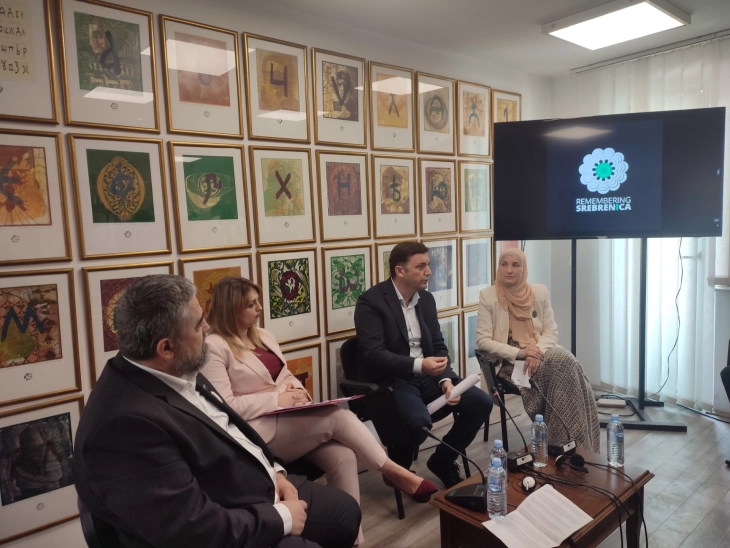Condemning any form of genocide is a universal human responsibility, says Foreign Minister
- Foreign Minister Bujar Osmani said Wednesday he was surprised by the reactions to the announcement that the Republic of North Macedonia is among the 17 countries co-sponsoring the United Nations Resolution declaring July 11 as an international day of remembrance and commemoration of the 1995 Srebrenica genocide.
- Post By Angel Dimoski
- 14:23, 17 April, 2024

Skopje, 17 April 2024 (MIA) - Foreign Minister Bujar Osmani said Wednesday he was surprised by the reactions to the announcement that the Republic of North Macedonia is among the 17 countries co-sponsoring the United Nations Resolution declaring July 11 as an international day of remembrance and commemoration of the 1995 Srebrenica genocide.
The Foreign Minister said he was surprised by people who said they believe the act would impact the country’s relations with Serbia, stressing that “it is a universal human responsibility to condemn any form of genocide, regardless of who the perpetrators are.”
“I didn’t expect reactions, I am even a bit shocked by the reactions of some of the citizens, which I think are encouraged by certain political parties. We mustn’t react to this topic because this issue enters the field of denying genocide, which is strictly forbidden... There is already a decision of the International Court of Justice declaring the acts in Srebrenica as genocide, and these court decisions can no longer be commented or interpreted. The Republic of North Macedonia in 2010, in its Parliament, adopted a declaration in support of the European resolution declaring genocide in Srebrenica. So, I think these reactions and interpretations are regretful, because I have no dilemma that there is no citizen in North Macedonia who wouldn’t condemn the murder of 8000 civilians – children, adults, exterminated in one day,” Osmani said in the headquarters of the Bosniak Democratic Union where a panel discussion was held before his statement.
The co-sponsoring of the Resolution means that the country is a part of the initiative put forward by Bosnia and Herzegovina, and is participating in the drafting of its text alongside the other co-sponsors. The Resolution will be presented to the UN General Assembly on Wednesday and will be put to vote on May 2.

Osmani stressed that North Macedonia is expected to be a co-sponsor of such a resolution, “as one of the biggest promotors of multiethnicity and diversity”, and it is especially expected, he said, “that we condemn any act of hate speech and any murder motivated by hatred of the other.”
Regarding the reactions in Serbia, the Foreign Minister stressed the importance of reconciliation and pointed to the example of France and Germany, which, he said, are great allies today “because the wounds have been healed through a sincere conversation about what happened,” as well as the measures taken by Germany in remembrance of the Holocaust.
“I am proud that North Macedonia is a part of the co-sponsors of the Resolution. That’s the only way to prevent such an act from happening again. Genocide isn’t only the act of extermination; it begins with hate speech and ends with its denial. That’s why we mustn’t be a part of any stage of genocide. I would’ve liked for the foreign ministers of Serbia and Bosnia and Herzegovina to have been here with me, so that we could reconcile together. Because there are two options – either war or reconciliation. The wars in the Balkans have ended, our only option is to reconcile, to heal our wounds and for anyone who has committed acts contrary to international and humanitarian law to apologize, so that we can move forward as the European Union did,” Osmani said.
Photo: MIA







